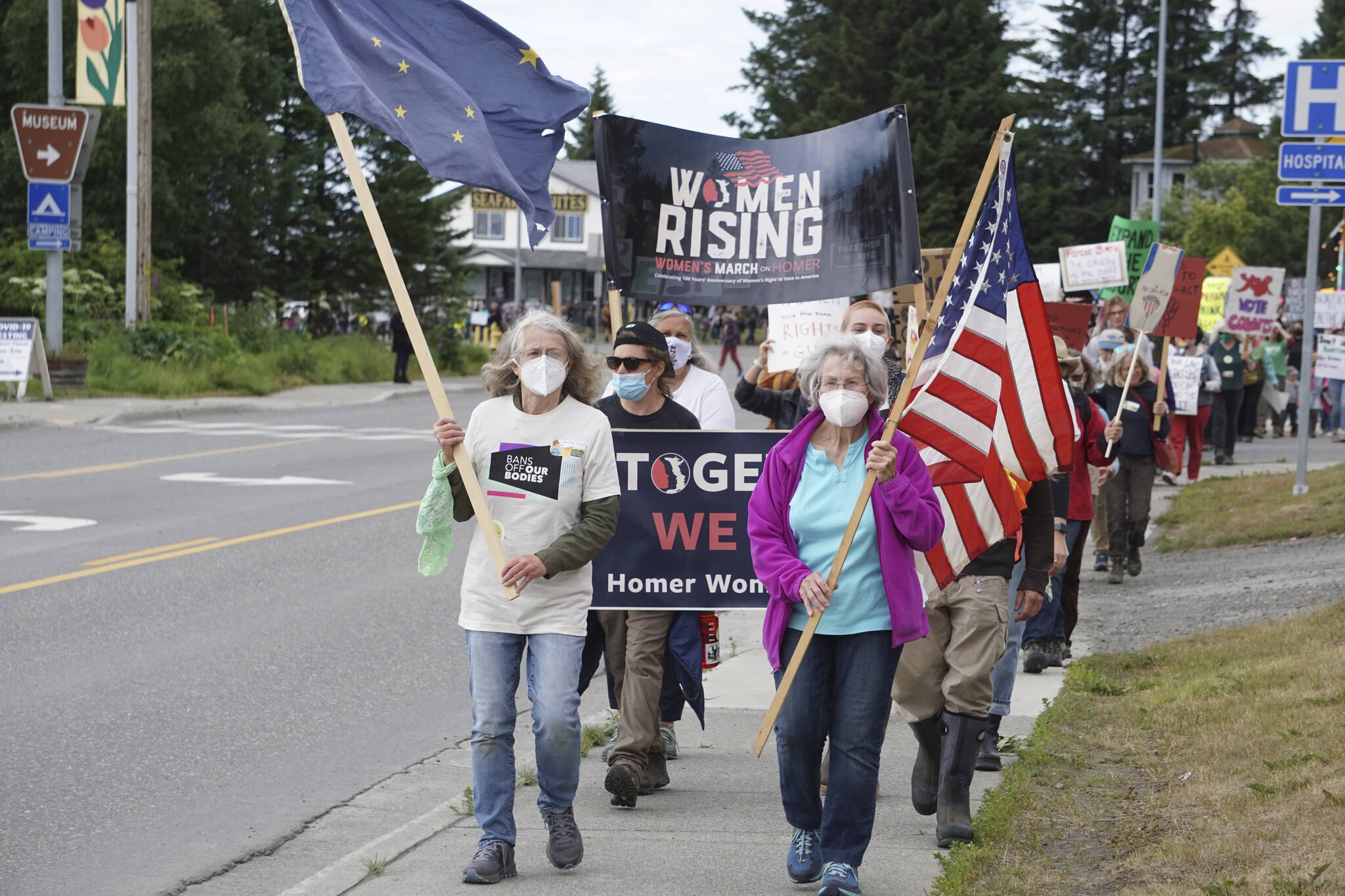In one of Homer’s largest protest marches, on Saturday about 400 people walked, held signs and chanted in protest of the U.S. Supreme Court decision, Dobbs v. Jackson, that reversed Roe v. Wade, allowing laws on abortion to be left to the states. Homer’s “Bans off our bodies” march joined other state protests on Saturday to protect reproductive rights.
Led by several women carrying signs that read “Women Rising: March on Homer” and “Together We Stand,” the march started at the HERC parking lot, went along Pioneer Avenue, and ended at Wisdom, Knowledge, Faith and Love Park. “Abortion care is health care,” the group chanted, and “Women must decided our fate, not the church and not the state.”
They carried signs like “Resistance is fertile,” “You thought we were nasty before,” “Bans off our bodies” and others with slogans that can’t be repeated in a family newspaper. One man dressed in a uterus costume and wore a blonde bouffant wig.
Although march organizers provided directions in the event of “disruptors” — keep going, don’t engage and look straight ahead — there were no apparent counter protesters.
At WKFL Park, participants browsed tables with information on registering to vote and voting against an Alaska Constitutional Convention. People spoke on the importance of reproductive rights, Alaska’s right to privacy and the dangers of a constitutional convention. In a poignant series of oral history called the Momologues, several women shared their experiences with challenging pregnancies.
“Every one of those stories, the many varied, individual stories, is important,” said Claudia Haines, CEO of Kachemak Bay Family Planning Clinic. “But frankly, it’s none of our business. Abortion care is health care, and like all health care, the private decision is between us and our medical provider. Period.”
Haines said people have said they’re tired of marching.
“Some of you have marched for decades to voice our support for a woman’s right to choose,” she said. “It matters that you are here. Fellow Alaskans are marching across the state today with us, and we have to keep doing that. … Today is a celebration of resiliency and solidarity.”
Lawyer Ginny Espenshade spoke about the importance of Alaska’s constitutional right to privacy, and the threats to it. Before she did that, she shared her own experience with a miscarriage. Labor had to be induced, and after her dead child was delivered, Espenshade said she had to undergo dilation and curretage, or D&C — the same procedure used in some abortions. A kind nurse “gave us the space and the grace to hold and then take home the tiny body,” she said.
After the Dobbs decision, Espenshade said, “Today, in a growing number of states, someone who experiences such a loss or chooses to terminate a pregnancy could be investigated for a crime. Their medical records, internet searches, bathroom trash, menstrual tracking apps and communications with others could be subjected to search warrants. … All this because the U.S. Supreme Court now allows state governments to invade the deeply personal spiritual and private realm of reproductive choice.”
Espenshade also spoke on how the Alaska constitutional right to privacy protects reproductive choice in Article 1, Section 22. The late Homer lawyer Irwin Ravin used that same clause to assert the right of adult Alaskans to use cannabis in the privacy of their own homes, she noted. The Dobbs decision suggests that Alaska judges might feel freer to revisit the Ravin and other decisions.
“To many of us, this is the most troubling aspect of the Dobbs decision and other recent U.S. Supreme Court ruling, which puts us on notice that no precedent is safe, be it separation of church and state, same-sex marriage or intimacy, Indigenous sovereignty, and even state legislature control of elections,” Espenshade said.
Former Rep. Paul Seaton warned of the dangers of voting to hold a constitutional convention. If that happens, everything would be on the table, he said.
“Every provision in the Constitution would have numerous special-interests lobbying for their own special interests,” he said. “Look at where we are now. The governor has proposed a constitutional amendment to eliminate application of the right to privacy.”
Groups could lobby to change single-subject legislative bills. Fishing interests might try to own the fish swimming in Alaska waters before they’re caught, Seaton said.
“Everything we take for granted will be subject to the special interest pressure if Alaskans vote to have a new constitution,” Seaton said.
Haines and Espenshade issued calls for action. Haines urged people to do two things.
“Make sure you’re registered to vote,” she said. “… The next thing to do is stay informed about reproductive health topics.”
“Use your power,” Espenshade said. “Use your power to impact who is on the court, whether we have a constitutional convention, who is in the state House and Senate, and who is is the U.S. House and Senate. … Vote, vote, vote, vote at every level.”
Reach Michael Armstrong at marmstrong@homernews.com.

